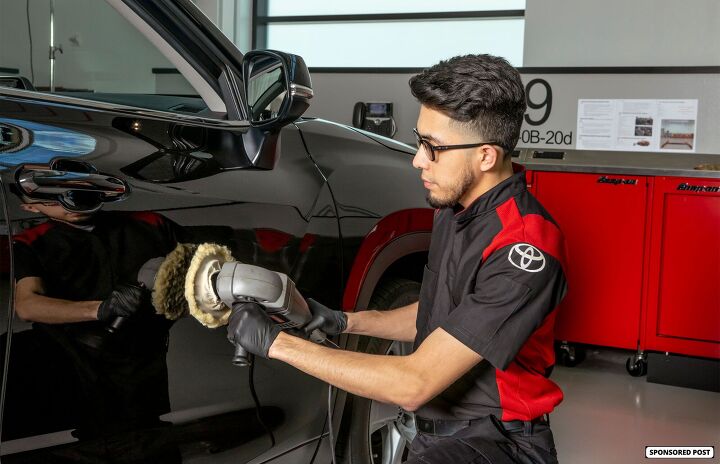Be Prepared: What To Do Following A Car Accident
When purchasing car insurance, we all hope we’ll never have to use it. And while there are several steps you can take to avoid accidents, the reality is that an average of six million car accidents occur every year in the United States. Sooner or later, most of us will experience an accident, be it a fender-bender or a more severe collision. So, what do you do in the aftermath? Committing this information to memory can help keep an incredibly stressful situation from becoming overwhelming, so let’s go through the steps you should take.
AutoGuide.com thanks Toyota Insurance for sponsoring this insurance series
There are precautionary actions you can take that will make the situation much less stressful should you ever get into an accident. If your insurance company has an app, or you have an agent with a personal phone number, be sure to have that information easily accessible on your phone. Keep proof of your auto insurance policy in your vehicle where you can easily find it and set a reminder on your calendar or phone to change out the physical policy each six months when you receive an updated version.
If you are part of the ToyotaCare family, or your insurance company offers roadside assistance, or even a 3rd party membership like AAA, be sure you also have that contact information stored and easily accessible. Of course, none of this will do any good if your phone isn’t charged, so always keep a cell phone charger in your vehicle. It’s also a good idea to get into the habit of charging your phone while you’re driving—even if you don’t think it needs it! If your battery is never low, you’ll never have to worry about not being able to use it in an emergency.
Finally, be sure to keep emergency supplies in your vehicle. There are “car care” kits available online and in auto supply stores that often include jumper cables, flares, and other helpful resources, but you’ll also want to be prepared for dealing with the natural elements. In the winter, or if you live in a cold climate, consider keeping blankets, hand warmers, and energy bars in your vehicle (preferably in a location where you can access them without leaving the vehicle). If you live in a hotter climate, or are driving during the summer, keep extra water on hand.
Having taken all these steps to be as prepared as possible, imagine that you have just been in an accident. Ideally, with a single button push conveniently located in the cabin of your Toyota vehicle, Toyota’s Safety Connect® would connect you directly with a 24/7 emergency response agent who can then send out the applicable emergency services to your location. This includes fire, police, and ambulance. However, not all vehicles are able to offer that benefit. So, first, and most importantly, check yourself and anyone else in your vehicle for injuries. You’ll then want to assess your surroundings—are you in the middle of a roadway? Are you able to easily maneuver your vehicle to the side of the road or a nearby parking lot? Are there any other significant dangers you need to consider? Once you feel sure you are safe, take note of your location and call the police. If you are unable to move your vehicle you should immediately set up flares, trigger your emergency flashers and/or raise the hood of your car to let other drivers know there has been an accident.
While you wait for the police to arrive you can begin documenting the scene of the accident. If you are safely able to do so, you’ll want to gather as many details about the accident as possible, including pictures and video of both vehicles and the area where the accident occurred. Many people forget to document the position of the cars relative to the street, which can be crucial for adjusters trying to recreate the accident in order to determine responsibility. You can also sketch a diagram of the crash scene or use a notetaking app on your phone to take down information about weather, visibility, and other details.
You will also need to exchange the appropriate insurance and contact information with the other driver, but you should avoid any discussion of responsibility regarding the accident. If they become upset, get aggressive, or seem impaired, take the steps you need to in order to feel safe and make a note of their behavior for your report. Once they arrive, police will fill out an accident report. This is important: NEVER leave the scene of an accident without a police report. That report will be important to your insurance company and could help you avoid further issues down the road. If you need a tow truck and do not have access to roadside assistance, be sure to verify the driver’s credentials and take down all contact information before releasing your vehicle to them.
You should get in touch with your insurance company as soon as possible to let them know an accident has occurred—they may have specific instructions for the information you should gather and could help you with securing a tow truck or rental car. It might be tempting to try and negotiate a cash deal with the other driver in an effort to avoid making an insurance claim and potentially increasing your rates, but not notifying your insurance company could leave you liable for damages stemming from the accident beyond your initial agreement. Once you’ve left the scene your agent or your company’s app will help you submit all the necessary information and navigate your options when it comes to damages, repairs, and what (if anything) you’ll need to pay.
Finally, it’s important to remember that many injuries that result from car accidents—head and spine trauma, internal bleeding, etc.—can take several days to become apparent. Even if you were only in a small fender-bender, should you start to feel unwell after an accident, it’s a good idea to visit a doctor. Having an abundance of caution before getting in your vehicle, while on the road, when documenting an accident, and in the aftermath of a collision will help you avoid costly mistakes and dangerous oversights. As the saying goes, it’s much better to be safe than sorry!
More by AutoGuide.com News Staff




































Comments
Join the conversation
This is a really helpful guide—accidents can be overwhelming, and having a clear plan makes a big difference. I’d also add that if your vehicle is badly damaged and beyond repair, reaching out to a licensed car wrecker can be a practical next step. At A1 Wreckers, we help Aussies across Queensland get rid of unwanted or accident-damaged vehicles with free towing and instant cash offers. It's a stress-free way to move on after an unfortunate event. Thanks for sharing this info! visit: https://www.a1wreckers.com.au/